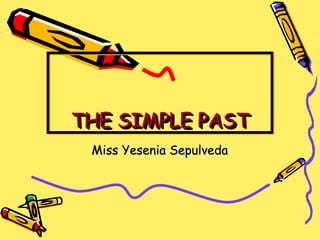
The past-simple
- 1. THE SIMPLE PAST THE SIMPLE PAST Miss Yesenia Sepulveda
- 2. We use the SIMPLE PAST to talk about actions that started and finished at a specific time in the past. So, different adverbs of time are used: yesterday, last mont, last week last year, etc.
- 3. 2 types of verbs • REGULAR • IRREGULAR
- 4. REGULAR VERBS For Regular verbs the simple past is formed by adding “ED" at the end of the verb: verb + ed = simple past Play played walk walked Listen listened Watch watched
- 5. IRREGULAR VERBS Irregular verbs don't form the past tense by adding -ed. They suffer a change in the spelling, so...you have to memorize them! Go – went Eat – ate Read – read etc.
- 6. Spelling • 1) Double the consonant if the consonant is stressed stop – stopped swap - swapped • 2)Add only –d, when the verb ends with –e love – loved save – saved • 3)Verbs ending in 'y' preceded by a consonant: Change 'y' to 'i' Then add -ed. hurry - he hurried (watch out! play – played)
- 7. Certain change patterns • speak spoke • eat ate • see saw • fly flew • think thought
- 8. Verb TO BE I you he was we were she they it
- 9. The most important irregular verb is the verb "TO BE“ SIMPLE PRESENT SIMPLE PAST I am I was You are You were He/she/it is He/she/it was We are We were You are You were They are They were
- 10. Negative Sentences SUBJECT + DID NOT + VERB (base form) Example: I did not work yesterday or I didn’t work yesterday INCORRECT: I didn’t worked
- 11. More examples: - I didn’t go on holiday last year - I didn’t went on holiday last year
- 12. Negative Sentences verb TO BE WAS / WERE + NOT Examples: I was not at school yesterday afternoon or I wasn’t at school yesterday afternoon They were not at home last weekend or They weren’t at home last weekend
- 13. Yes /No Questions DID + subject + main verb + rest of sentence + ? Example: Did you work yesterday? - Yes, I did. - No, I didn’t.
- 14. Yes /No Questions verb TO BE WAS / WERE + subject + rest of sentence + ? Example: Were you at home last weekend? - Yes, I was. - No, I wasn’t.
- 15. REMEMBER!! • Positive sentences: – I played football yesterday – I went home early on Saturday • Negative sentences: – I didn’t play football yesterday – I didn’t go home early on Saturday • Yes/No questions: – Did you play football yesterday? – Did you go home early in Saturday?
- 16. REMEMBER!! Verb TO BE • Positive sentences: – I was in London last year • Negative sentences: -They weren’t at home last weekend • Yes/No questions: – Were you ill yesterday?
- 17. AFFIRMATIVE NEGATIVE Yesterday I played football Yesterday I didn't play football Last week she had a party Last week she didn't have a party Last month we went to England Last month we didn't go to England They arrived at ten o'clock They didn't arrive at ten o'clock
- 18. Put the verbs into the correct form (simple past). 1. It (be) ____ great. 2. I (travel) _____ around by car with two friends and we (visit) _____ lots of interesting places. 3. In the evenings we usually (go) _____ to a pub. 4. We (be) ___ lucky with the weather. 5. It (not / rain) ______ a lot. 6. We (not /see) ______any rainbows.
- 19. 7. I (not / cook) ________ so we (go) _____ out for dinner. 8. The sun (not / shine ) _____ that day. 9. I (not / hear) ______ you when you (arrive) ______ at home. 10. She (not / like) _____ rice, so she (eat) ___ sausages. 11. We (are) _____ in the restaurant when the waiter (shout) _______.
- 20. WELL DONE!!